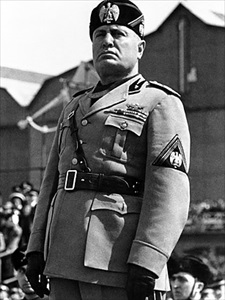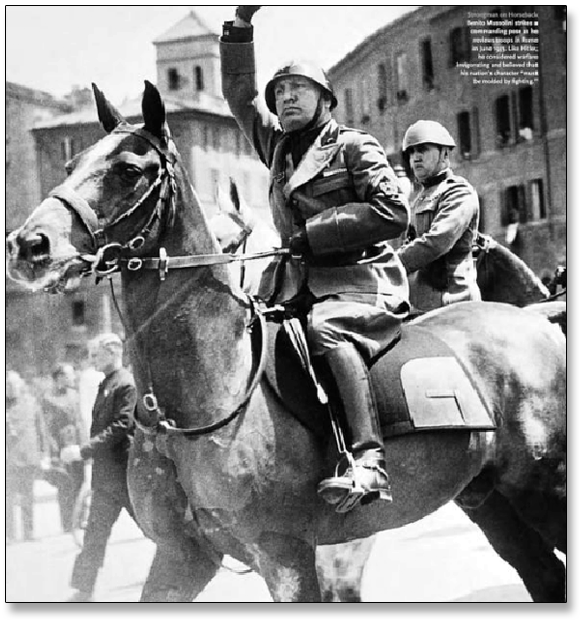MUSSOLINI, BENITO (1883–1945)

Mussolini was the first fascist dictator in Europe, coining the term fascism in 1914. After an undistinguished military career during World War I, Mussolini launched the Fasci Italiani di Combattimento, a fascist organization that attracted many unemployed war veterans. In 1921 he founded the National Fascist Party in Rome and was elected to the Chamber of Deputies.
In the political chaos of Italian politics in 1922, he and his followers threatened a march on the capital, Rome. King Victor Emmanuel III invited Mussolini to form a new government. Three years later Mussolini assumed dictatorial powers and adopted the title “Il Duce” (the Leader).
After invading and conquering Abyssinia in Northeast Africa in 1935–36, Il Duce dispatched Italian troops and equipment to Spain, an act that drew him closer to another European dictator, Adolf Hitler. A friendship treaty in October 1936 solidified a Rome-Berlin axis, around which other European (and eventually several Southeast Asian) nations coalesced.
Mussolini declared war on France and her ally, Great Britain, in the wake of Hitler’s sweep through the Low Countries and France in May 1940. Less than two years after the United States was pulled into World War II, the nations opposing Hitler and Mussolini landed armed forces in Sicily in 1943 (Operation Husky) and began moving up the Italian mainland. On July 25, 1943, Mussolini was dismissed from office by the Grand Council of Fascism and imprisoned—only to be rescued by a German commando unit. Hitler then set up his ally as head of a German puppet state in Northern Italy. In late April 1945 members of the Italian resistance captured, killed, and hung Mussolini from the roof of a gas station in Milan, where passersby mutilated his body.

History’s Verdict: Benito Mussolini
![]()

 History buffs, there is good news! The Daily Chronicles of World War II is now available as an ebook for $4.99 on Amazon.com. Containing a year’s worth of dated entries from this website, the ebook brings the story of this tumultuous era to life in a compelling, authoritative, and succinct manner. Featuring inventive navigation aids, the ebook enables readers to instantly move forward or backward by month and date to different dated entries. Simple and elegant! Click
History buffs, there is good news! The Daily Chronicles of World War II is now available as an ebook for $4.99 on Amazon.com. Containing a year’s worth of dated entries from this website, the ebook brings the story of this tumultuous era to life in a compelling, authoritative, and succinct manner. Featuring inventive navigation aids, the ebook enables readers to instantly move forward or backward by month and date to different dated entries. Simple and elegant! Click 











